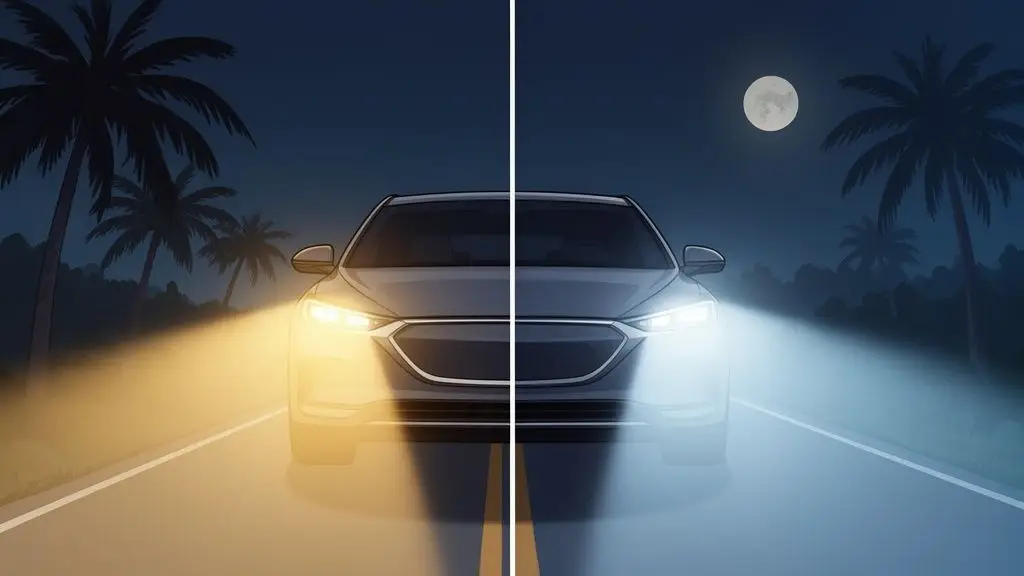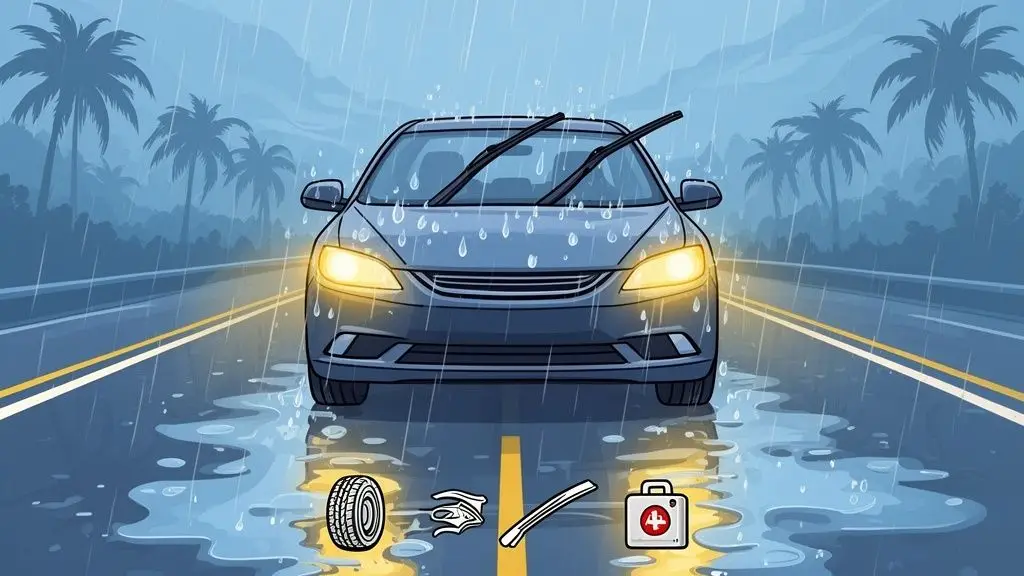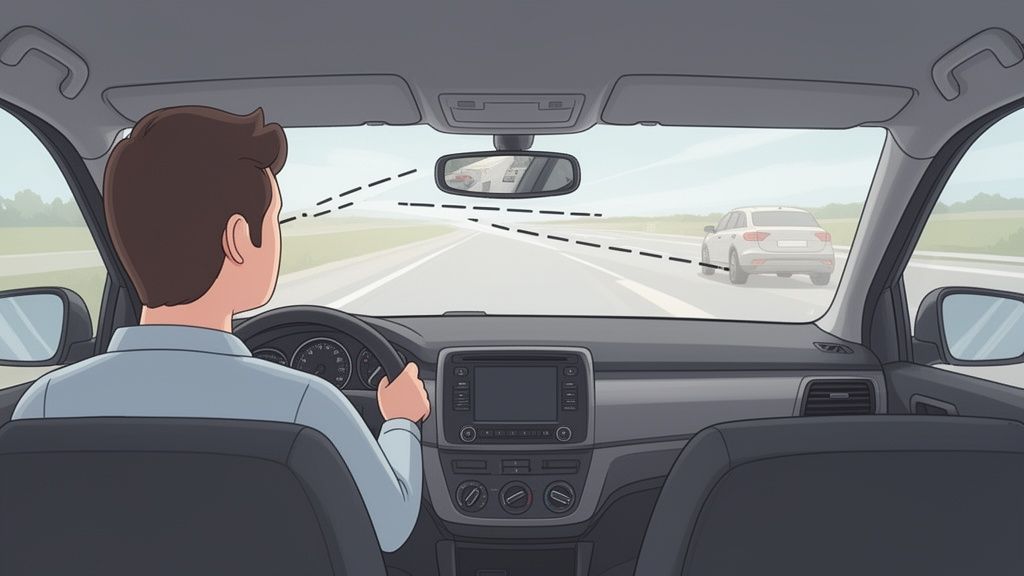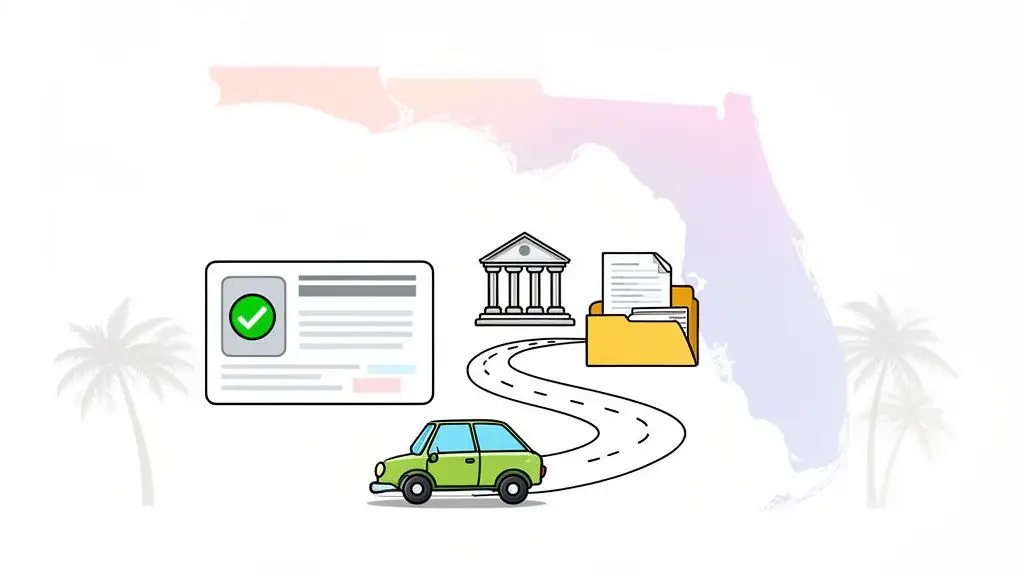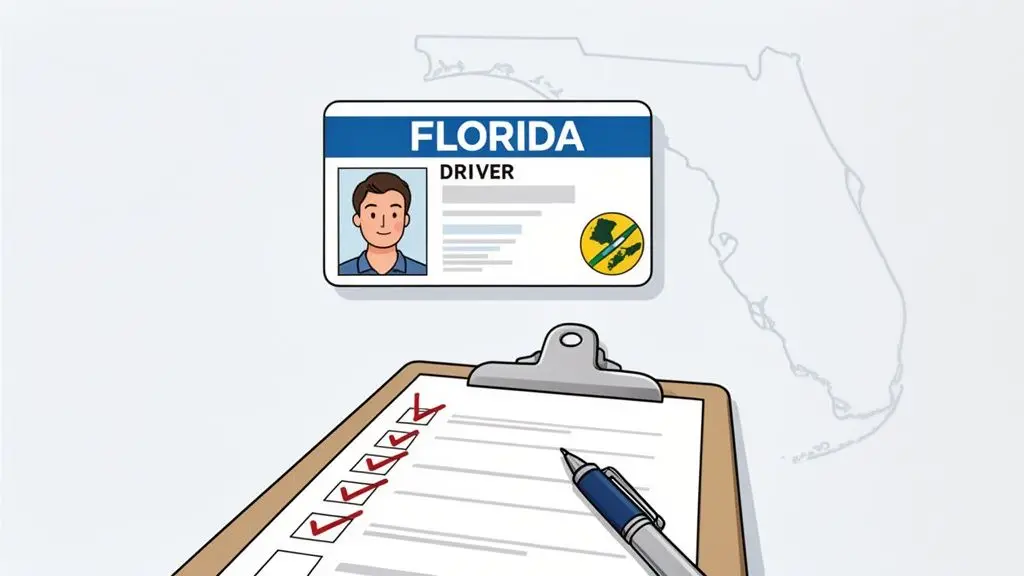Seeing flashing lights in your rearview mirror is a stressful experience. But after you receive a Florida traffic ticket, it is important to stay calm. First, you need to carefully read the entire citation. Do not just look at the fine amount. Instead, notice the specific violation, read the officer’s notes, and find the deadline for your response. In most cases, you have 30 days to make a decision. Taking a moment to understand your options can save you money and protect your driving record.
Your First Steps After Getting a Florida Traffic Ticket
Holding the ticket, you have a few choices to consider. Generally, you can pay the fine and accept the points, go to court to fight the citation, or sign up for a state-approved traffic school. The choice you make will directly impact your driving record. Consequently, it can also affect your car insurance rates for many years. Many drivers receive tickets for common mistakes on the road.
As you can see, simple errors are often the reason for a ticket. Therefore, your next move is very important for your future driving record.
Understanding Your Three Main Options
For many Florida drivers, the best choice is to elect to take a Basic Driver Improvement (BDI) course. This is also known as traffic school. Why is this a good option? Because when you complete the course, the state does not add points to your license. This is a big benefit. In fact, it’s the best way to prevent your insurance company from raising your rates after a moving violation. For more information on this, the National Highway Traffic Safety Administration (NHTSA) provides clear guidelines on state traffic laws.
To help you decide, let’s look at what each path involves.
| Option | Potential Outcome | Key Consideration |
|---|---|---|
| Pay the Ticket | Points are added to your license. As a result, your insurance rates will likely increase at your next renewal. | This is the fastest option, but it is often the most expensive choice in the long run. |
| Contest in Court | The ticket could be dismissed or the fine reduced. However, you could also lose and have to pay the fine plus court costs. | This option takes time and requires you to prepare an argument and attend a hearing. |
| Elect Traffic School | No points are added to your record. Therefore, your insurance company is not notified of the ticket. | In Florida, you can only choose this option 5 times in your life and only once every 12 months. |
Each option has good and bad points, so making an informed decision is vital.
Before you simply pay the fine, it is smart to understand what is traffic school and how the process works. A few minutes of research can stop a small mistake from becoming a big financial problem.
Using Traffic School to Protect Your Driving Record
So, you received a ticket. It can happen to anyone. The good news is that for most common traffic tickets in Florida, you have a great tool available: a basic driver course. Choosing a driver improvement class is often the smartest move to protect your driving record. Likewise, it keeps a simple error from causing long-term issues.
The most common choice for drivers is the Basic Driver Improvement (BDI) course. When you choose to take a Florida approved BDI course, you are doing more than just handling a ticket. You are preventing points from ever being added to your license. This single action is the key to keeping your record clean. In addition, it helps you avoid the problems that come with getting too many points, which could lead to a suspended license.
How a Basic Driver Course in Florida Helps You
The benefits of a basic driver course are significant and go beyond just avoiding points. As soon as points appear on your record, your insurance company sees you as a higher-risk driver. As a result, this almost always means you will pay higher insurance costs.
By completing a BDI course, your insurance provider is never told about the violation. This means you can avoid those painful rate increases. Think of it this way: a few hours of your time can save you hundreds, or even thousands, of dollars over the next few years.
Here are the different Florida traffic school online courses available, each designed for a specific need.
Each course is made for a different purpose. For example, some help you dismiss a ticket, while others may be required by a court. Finding the right one for your situation is simple.
Different Courses for Different Situations
While the 4-Hour Basic Driver Improvement Course is what most people use for a minor ticket, Florida offers other options for more serious issues. It is important to know which one fits your needs.
- 8-Hour Intermediate Driver Improvement: If the violation was more serious, a judge might order you to take this course. It covers defensive driving techniques in more detail.
- Driver Education Traffic Safety (DETS): This 6-hour course is mandatory for all first time drivers under the age of 18 years before they can get a learner’s permit.
- Traffic Law and Substance Abuse Education (TLSAE): This is a required course for all first-time drivers 18 years of age and older in Florida before they can get a learner’s permit or driver’s license.
- Mature Driver Course: This is designed for drivers 55 and older and can often lead to an insurance discount.
Knowing about these courses helps you manage the situation well. The main goal is to make our roads safer by improving driver skills. This idea is supported by a lot of research. For example, the Insurance Institute for Highway Safety (IIHS) studies how driver education can reduce collisions.
Taking the right course not only helps you reduce traffic ticket penalties but also makes you a safer driver. You should explore your traffic ticket options as soon as possible. Making a smart decision now will protect your finances and your driving record.
The True Cost of a Florida Traffic Ticket
The fine printed on your Florida traffic ticket is just the start. The real financial impact of a citation goes far beyond that first payment. It can create a chain reaction that affects your budget for years.
The amount you owe can also be very different from one county to another. Local fees are often added to the state penalty. So, a ticket in Miami-Dade County might have a different total cost than the same ticket in a northern county.
This is not just a problem in Florida. A 2024 study showed how much speeding ticket costs can vary across the United States. Driving just 10 mph over the speed limit could cost as little as $25 in some states. However, the same mistake in California could cost $234. This shows how much your location can matter for the immediate cost of a ticket.
How Points Lead to Higher Insurance Rates
The biggest financial hit usually comes from your insurance company. When you simply pay the fine for a moving violation, you are pleading guilty. Then, the Florida DHSMV adds points to your driving record. Your insurance company sees these points as a clear sign that you are a higher-risk driver.
The next time you renew your policy, you may be surprised. Even one small ticket can increase your premium by 20% or more. This is an extra cost you will have to pay for the next three to five years. As a result, a simple mistake on the road can turn into hundreds, or even thousands, of dollars in extra insurance payments. That is why it is so important to learn how to reduce points on your license before they are added to your record.
The Financial Benefit of Traffic School
Here is where you need to make a choice, and the math is quite simple. Let’s compare the two paths you can take after getting a ticket.
- Path 1: Just Pay the Fine. You pay the full amount, accept the points on your license, and prepare for years of higher insurance costs.
- Path 2: Attend Traffic School. You pay a small course fee and a reduced court fine. In return, you keep the points off your record. Your insurance company never finds out about the ticket, so your rates do not go up.
By choosing a defensive driving course, you are making a small, one-time payment that saves you from a much larger, long-term financial problem. The savings are real and add up quickly.
When you look at the numbers, the best option becomes clear. Going to a Florida approved traffic school is not just about learning new driving skills. It is the smartest financial move you can make to reduce traffic ticket costs and keep a small mistake from damaging your budget.
Taking Your Ticket to Court
Are you sure the ticket was a mistake? You have the right to fight it in court. This is not an easy path, but if you believe you were cited unfairly, it is a good way to keep your driving record clean.
When you decide to contest a ticket, you plead “not guilty.” This tells the court that you want a judge to review the facts and make a decision. The process starts when you notify the Clerk of Court in the county where you got the ticket. However, that is just the first step. The real work is in preparing your case.
Preparing Your Case Before the Hearing
Winning in court is usually the result of good preparation. Your chance of success is much higher if you prepare well from the beginning.
- Return to the Scene: If it is safe, go back to where the traffic stop happened. Take pictures from different angles. For example, is a speed limit sign blocked by a tree? Is a “No Turn on Red” sign hard to read? Document everything.
- Find Witnesses: Did anyone else see what happened? If so, get their name and phone number. A good witness who can support your story is very valuable.
- Check the Citation: Read the ticket very carefully. Police officers can make mistakes. An incorrect street name, time, or even car model can sometimes create reasonable doubt.
Your main goal is to build a logical, fact-based argument. The more organized you are, the more believable you will be in court.
What to Expect in the Courtroom
First, always be respectful. This applies to the judge, the prosecutor, and the officer who gave you the ticket. When it is your turn to speak, be calm and clear. Stick to the facts and avoid getting emotional.
Pro Tip: Listen carefully when the officer presents their side of the story. If what they say in court is different from what is on the citation, you can politely ask them about the difference. This can be a very effective strategy.
Often, you will have a chance to speak with the prosecutor before the hearing starts. This is a good time to negotiate. They might be willing to reduce the charge to a non-moving violation, which means no points on your license. This would be a great outcome.
Sometimes a court may offer a deferral. This means the ticket is dismissed if you have a clean record for a certain period. Always ask about your options. To learn more about courtroom strategies, check out our guide on how to contest a traffic ticket.
How Technology is Changing Traffic Rules
Do you think traffic enforcement is still just an officer with a radar gun? Those days are changing quickly. Technology has completely transformed how traffic laws are enforced. In some ways, this makes our roads safer. However, it also means drivers need to be more aware than ever.
The biggest change is the rise of automated systems. You have likely seen them. These are the red-light cameras at busy intersections and speed cameras in school zones. These are not just simple cameras. They are getting smarter and more advanced every year.
The Growth of Automated Cameras
Red-light cameras are fairly simple. They are set up to detect any vehicle that crosses the stop line after the light turns red. When this happens, the system automatically takes photos and video, capturing the license plate. Soon after, a ticket is mailed to the car’s registered owner.
Automated speed cameras work in a similar way. They use radar or lasers to measure your speed. If you go over the limit, the camera takes a picture. This technology is a popular way for law enforcement to reduce traffic ticket disputes. More importantly, it helps increase safety in high-risk areas. The Federal Highway Administration (FHWA) provides extensive information on how these systems are used to improve safety.
The point is not to try to beat these systems. The main lesson is that enforcement is becoming more constant. This should encourage all of us to practice safer driving habits all the time.
Using Data for Enforcement
It is not just about cameras. Law enforcement agencies now use data to decide where to focus their patrols. They study collision reports, traffic patterns, and ticket records to find “hot spots.” These are the specific locations where violations and crashes happen most often.
This means they can send officers exactly where they are needed most. For drivers, this means that if a certain road is known for speeding, there will likely be a stronger police presence there.
Understanding these modern methods can help you become a more defensive and careful driver. This is the best way to avoid getting a ticket in the first place. These efforts are part of a larger trend toward smarter and more efficient law enforcement.
Driver Education For Every Stage Of Life
Safe driving is a skill you need to practice throughout your life. The challenges you face as a 16-year-old new driver are very different from those of a driver in their 70s. That is why Florida offers specific driver education courses for every age and level of experience.
Starting Out Right: Teen Drivers
For teenagers, getting a driver’s license is a big step. But before they can get a learner’s permit in Florida, they must complete the mandatory Driver Education Traffic Safety (DETS) 6-Hour course.
The DETS course is based on a new Florida law created in 2025, providing valuable knowledge needed for a lifetime of safe driving. It is not just about memorizing rules for a test. It is about understanding the real-world results of your actions behind the wheel.
The course covers key topics that every new driver needs to know:
- How Florida’s traffic laws work in daily driving.
- The serious dangers of driving under the influence of alcohol or drugs.
- Defensive driving skills to help you see and react to dangers on the road.
This is not just a paperwork requirement. According to the Florida Highway Safety and Motor Vehicles (FLHSMV), this education is a key part of the state’s licensing program. It is designed to give young drivers the knowledge they need to avoid common mistakes.
The Traffic Laws Substance Abuse Education Course (TLSAE) 4-Hour is still mandatory for those 18 years of age and older.
Staying Confident: Senior Drivers
For Florida’s senior drivers, keeping their skills sharp is important for staying independent. Things change as we get older. Our vision, hearing, and reaction times may not be what they used to be. A Mature Driver Improvement course is a great way to address these changes.
These courses are designed for the specific challenges of older drivers. They offer practical advice on everything from driving through busy intersections to feeling more comfortable driving at night. The goal is simple: to help senior drivers stay safe and confident on the road.
There is also a great financial reason to take this course. Many Florida insurance companies offer a discount on car insurance for seniors who complete an approved Mature Driver Improvement course. It’s a win-win situation—you improve your skills and save money.
Florida Traffic Ticket Questions Answered
When you get a traffic ticket, many questions may come to mind. Let’s clear up the confusion and provide the answers you need about handling a ticket in Florida. We will cover who can take a basic driver traffic school Florida course, how points affect your insurance, and the different types of driver improvement courses.
Can I Take a BDI Course to Keep Points Off My License?
For most minor moving violations, the answer is yes. If you received a standard, non-criminal ticket, you can likely take a Basic Driver Improvement (BDI) course to avoid points on your record.
However, there are a few important rules you must follow:
- CDL Holders: If you have a commercial driver’s license (CDL), you cannot use this option to avoid points.
- The 12-Month Rule: You can only choose to take traffic school once in any 12-month period.
- The Lifetime Limit: The state of Florida allows you to use this option a maximum of five times in your entire life. The official Florida Department of Highway Safety and Motor Vehicles (FLHSMV) have all the information.
How Much Will a Ticket Really Cost Me?
The fine on the ticket is only the beginning. The biggest financial impact comes from the points on your license, which is a major concern for your insurance company. Once points are on your record, your insurer views you as a higher risk, and your premiums will almost certainly go up.
Consider this: a single speeding ticket can cause your insurance rates to increase by 20% or more. You will be paying this higher rate for the next three to five years.
Suddenly, the cost of a BDI course seems like a great deal. It is the smartest way to reduce traffic ticket costs over time.
What’s the Difference Between a BDI and a DETS or TLSAE Course?
It is easy to confuse these two, but they are for very different purposes.
The Driver Education Traffic Safety and the Traffic Law and Substance Abuse Education (TLSAE) course are required for all new drivers in Florida. It is a mandatory 6-hour (DETS) and 4-hour (TLSAE) program that teaches the basics of traffic laws and the dangers of impaired driving. You must complete it before you can apply for your learner’s permit.
On the other hand, the basic driver improvement course is what you take after you get a ticket to keep points off your license.
Ready to move past this ticket? There are many Florida approved traffic schools that offer state-approved, 100% online courses to fit your schedule. Find the right course to protect your driving record and your finances.
